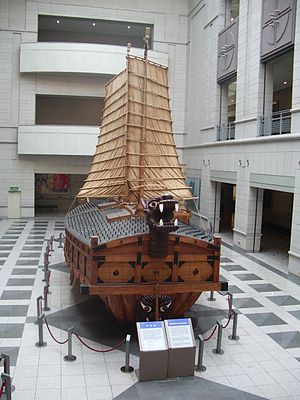Turtle ship

|
|
| Class overview | |
|---|---|
| Name: |
|
| Builders: | Yi Sun-sin |
| Operators: | Joseon |
| Built: | circa 1590 |
| In service: |
|
| Completed: | 20-40 units deployed, |
| Lost: | unknown number sank in Battle of Sacheon (1592) |
| Preserved: | replicas only in museums |
| History | |
|
|
|
| Laid down: | March 12, 1592 |
| Launched: | March 27, 1592 |
| In service: | May 15, 1592 |
| General characteristics | |
| Class and type: | Panokseon type |
| Length: | 100 to 120 feet |
| Beam: | 30 to 40 feet |
| Propulsion: | 80 oarsmen |
| Complement: | 50 soldiers |
| Armament: | sulfur gas thrower, iron spikes, 26 cannons |
| Notes: | in full operational conditions cannons ranged between 200 yds to 600 yds |
| Turtle ship | |
| Hangul | |
|---|---|
| Hanja | 거북 |
| Revised Romanization | Geobukseon |
| McCune–Reischauer | Kŏbuksŏn |
A turtle ship, also known as Geobukseon (거북선, Korean pronunciation: [kʌbuksən]), was a type of large Korean warship that was used intermittently by the Royal Korean Navy during the Joseon dynasty from the early 15th century up until the 19th century. It was used alongside the panokseon warships in the fight against invading Japanese naval ships. The ship's name derives from its protective shell-like covering. This design is often recognized as the first armored ship in the world.
The first references to older, first generation turtle ships, known as gwiseon (귀선; 龜船, Korean pronunciation: [kɥisʌn]), come from 1413 and 1415 records in the Annals of the Joseon Dynasty, which mention a mock battle between a gwiseon and a Japanese warship. However, these early turtle ships soon fell out of use as Korea’s naval preparedness decreased during a long period of relative peace.
Turtle ships participated in the war against Japanese naval forces supporting Toyotomi Hideyoshi's attempts to conquer Korea from 1592-1598. Korean Admiral Yi Sun-Shin is credited with designing the ship. His turtle ships were equipped with at least five different types of cannons. Their most distinguishable feature was a dragon-shaped head at the bow (front) that could launch cannon fire or flames from the mouth. Each was also equipped with a fully covered deck to deflect arrow fire, musket-shots, and incendiary weapons. The deck was covered with iron spikes to discourage enemy men from attempting to board the ship.
According to the Nanjung Ilgi, Yi's wartime diary, Yi decided to resurrect the turtle ship in 1591 from pre-existing designs (see picture, illustrated nearly 200 years earlier) after discussing the matter with his subordinates. Once concluding that a Japanese invasion was possible, if not imminent, Yi and his subordinate officers, among whom Na Dae-yong (羅大用) is named as the chief constructor, designed and built the first modern turtle ship. Yi's diary, along with the book entitled Hangnok written by his nephew Yi Beon, described numerous important details about the structures, construction progress, and the use of turtle ships in battle, as well as the testing of weaponry used in the ships.
...
Wikipedia
